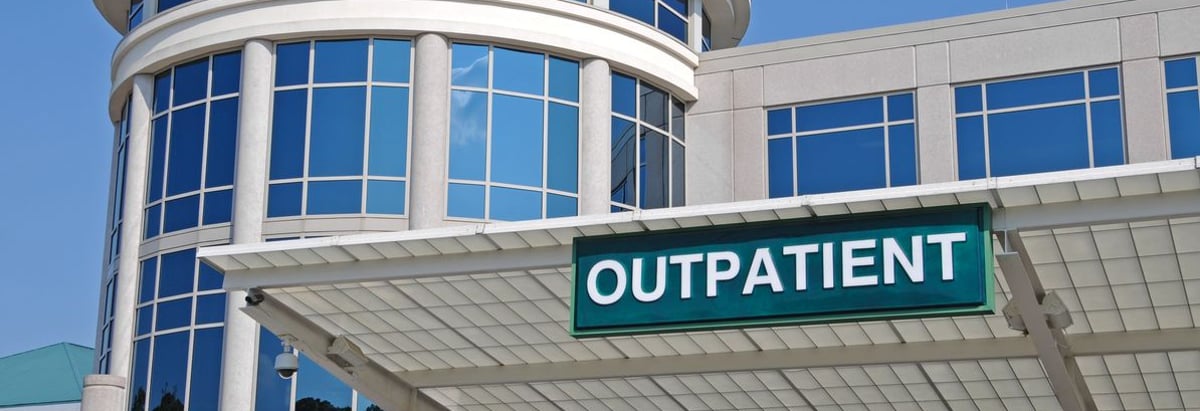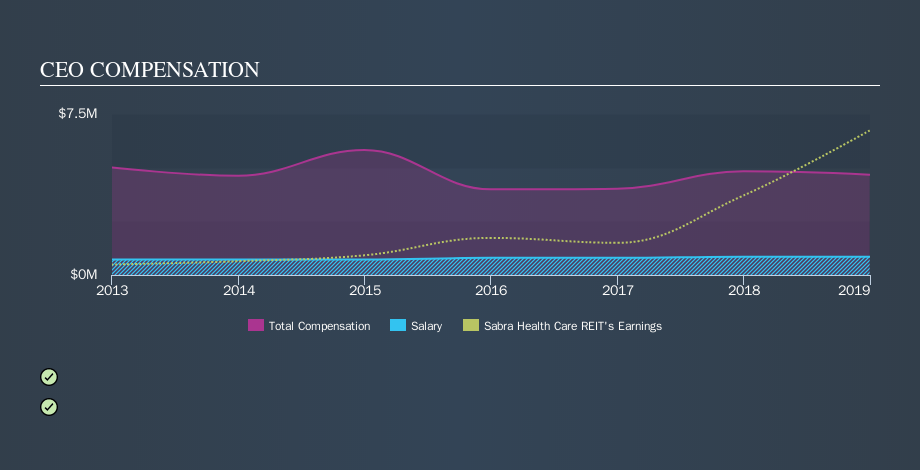- United States
- /
- Health Care REITs
- /
- NasdaqGS:SBRA
Should You Worry About Sabra Health Care REIT, Inc.'s (NASDAQ:SBRA) CEO Salary Level?

Rick Matros has been the CEO of Sabra Health Care REIT, Inc. (NASDAQ:SBRA) since 2010. This report will, first, examine the CEO compensation levels in comparison to CEO compensation at companies of similar size. Next, we'll consider growth that the business demonstrates. And finally we will reflect on how common stockholders have fared in the last few years, as a secondary measure of performance. This method should give us information to assess how appropriately the company pays the CEO.
Check out our latest analysis for Sabra Health Care REIT
How Does Rick Matros's Compensation Compare With Similar Sized Companies?
At the time of writing, our data says that Sabra Health Care REIT, Inc. has a market cap of US$4.3b, and reported total annual CEO compensation of US$4.7m for the year to December 2018. While we always look at total compensation first, we note that the salary component is less, at US$850k. We further remind readers that the CEO may face performance requirements to receive the non-salary part of the total compensation. We looked at a group of companies with market capitalizations from US$2.0b to US$6.4b, and the median CEO total compensation was US$5.1m.
That means Rick Matros receives fairly typical remuneration for the CEO of a company that size. While this data point isn't particularly informative alone, it gains more meaning when considered with business performance. It could be important to check this free visual depiction of what analysts expect for the future.
You can see a visual representation of the CEO compensation at Sabra Health Care REIT, below.

Is Sabra Health Care REIT, Inc. Growing?
Sabra Health Care REIT, Inc. has reduced its earnings per share by an average of 15% a year, over the last three years (measured with a line of best fit). In the last year, its revenue is down 9.9%.
Few shareholders would be pleased to read that earnings per share are lower over three years. And the impression is worse when you consider revenue is down year-on-year. These factors suggest that the business performance wouldn't really justify a high pay packet for the CEO.
Has Sabra Health Care REIT, Inc. Been A Good Investment?
Sabra Health Care REIT, Inc. has served shareholders reasonably well, with a total return of 31% over three years. But they would probably prefer not to see CEO compensation far in excess of the median.
In Summary...
Remuneration for Rick Matros is close enough to the median pay for a CEO of a similar sized company .
We feel that earnings per share have been a bit disappointing, but and we don't think the total returns are amazing. We're not saying the CEO pay is too generous, but it's probably fair to say that many shareholders would like to see improved performance, before any pay rise occurs. So you may want to check if insiders are buying Sabra Health Care REIT shares with their own money (free access).
Of course, you might find a fantastic investment by looking elsewhere. So take a peek at this free list of interesting companies.
We aim to bring you long-term focused research analysis driven by fundamental data. Note that our analysis may not factor in the latest price-sensitive company announcements or qualitative material.
If you spot an error that warrants correction, please contact the editor at editorial-team@simplywallst.com. This article by Simply Wall St is general in nature. It does not constitute a recommendation to buy or sell any stock, and does not take account of your objectives, or your financial situation. Simply Wall St has no position in the stocks mentioned. Thank you for reading.
About NasdaqGS:SBRA
Sabra Health Care REIT
As of March 31, 2025, Sabra’s investment portfolio included 364 real estate properties held for investment (consisting of (i) 224 skilled nursing/transitional care facilities, (ii) 39 senior housing communities (“senior housing - leased”), (iii) 69 senior housing communities operated by third-party property managers pursuant to property management agreements (“senior housing - managed”), (iv) 17 behavioral health facilities and (v) 15 specialty hospitals and other facilities), 15 investments in loans receivable (consisting of three mortgage loans and 12 other loans), four preferred equity investments and two investments in unconsolidated joint ventures.
Good value with proven track record and pays a dividend.
Similar Companies
Market Insights
Community Narratives



